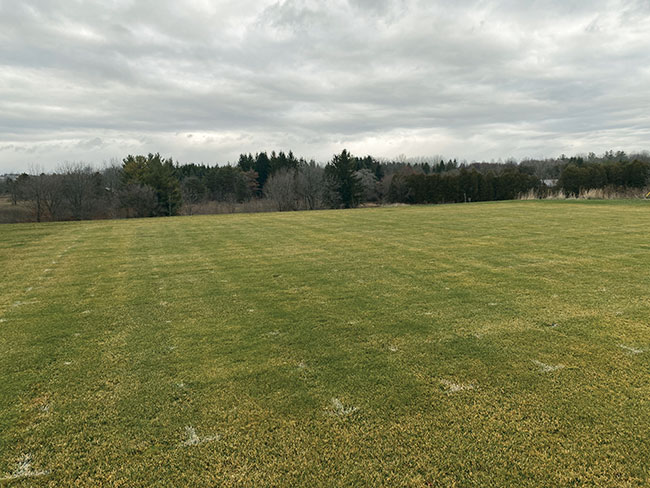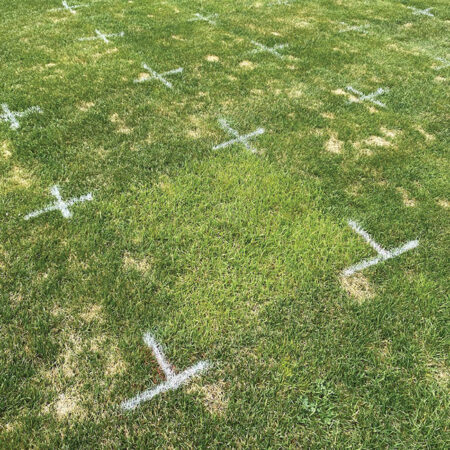
Features
Earth Week
Eco-Friendly Soils
GTI cultivar trials: an update on experimental drought-tolerant turfgrasses
Kentucky bluegrass, turf-type tall fescue trials
February 14, 2023 By By Dr. Sara Stricker and Research by John Watson and Dr. Eric Lyons
 The ongoing NTEP tall fescue trial at the Guelph Turfgrass Institute.
all photos: Guelph Turfgrass Institute
The ongoing NTEP tall fescue trial at the Guelph Turfgrass Institute.
all photos: Guelph Turfgrass Institute There are two types of cultivar trials in progress at the Guelph Turfgrass Institute, both with the goal of improving turf performance in Canada.
The Turfgrass Water Conservation Alliance (TWCA) cultivar trials compare experimental cultivars against known drought-tolerant standards to qualify drought-tolerant turfgrasses for responsible use in the managed environment.
This drought qualification trialing uses standardized methods across multiple years and locations to achieve a meaningful comparison of drought tolerance across a broad geographic range. The trial in Guelph, Ont. was one of nine locations across Canada and the United States which ran a trial on Kentucky bluegrass trials in 2018–2021.
The TWCA trials use rainout shelters which limit the rainfall over the trial. The shelters are covered with clear plastic covering to allow light penetration, and they are open at the bottom and sides to allow for airflow. Data is collected using a lightbox and camera, and the photos are analyzed using digital image analysis (DIA) technology developed by the University of Arkansas and NexGen.
Of the 59 entered cultivars (including known standards), 10 entries qualified unanimously having clearly met or exceeded drought tolerance at all locations (see table). Note that some of these cultivars are proprietary and have not been named yet, but you can also check for the TWCA seal on the product.
The second type of cultivar trial run at the Guelph Turfgrass Institute is the National Turfgrass Evaluation Project (NTEP) turf-type tall fescue evaluation. Cultivar trial sponsored by NTEP use an entirely different protocol. The NTEP trials for tall fescue do not use fungicides and only sparingly apply herbicides when needed. In addition, this trial is regularly irrigated.
NTEP is a non-profit program, sponsored by the Beltsville Agricultural Research Center and the National Turfgrass Federation, Inc. The data from tests can be used by extension specialists and others for making recommendations, and turf managers can access the reports on the different turf species online to compare the performance of the cultivars in their geographic region.
The NTEP tall fescue trial in Guelph collected data on density, colour, spring greenup, snow mould damage, and leaf texture. Since this is the trial that is in Canada (and the furthest north), NTEP classifies this trial as the “winter hardiness evaluation.”
One of the biggest issues with using tall fescue in Canada is winter survival and snow mould resistance. We noticed some severe snow mould damage on many of the cultivars – and notably the older, wider-texture cultivar (with an undesirable lime green colour) exhibited decent resistance to snow mould damage (see image). This is a challenge to the turf breeders – can you please input those disease defence genes into the newer, finer-textured cultivars?

Snow mould damage in the tall fescue trial.
Notably the cultivars Firecracker, Teacher, PPG-TF 231, and PPG-TF267 had less snow mould in spring of 2022. For the best overall performance, which includes summer colour and density, the cultivars listed in the table below averaged out with the best performance out of 132 cultivars tested.
Please note that the NTEP data is still preliminary, and we will be conducting two more years of data collection before the final report is issued.
Most recently, the researchers at the Guelph Turfgrass Institute have seeded both a tall fescue TWCA trial and a perennial ryegrass NTEP trial, so be sure to stay tuned for more results coming out of those trials in the future. The University of Guelph and the Guelph Turfgrass Institute continues to work with breeders and seed producers to provide cultivar testing for Ontario and the Canadian turfgrass industry.
For more information, visit the Turfgrass Water Conservation Association (TGWCA.org), the National Turfgrass Evaluation Project (NTEP.org), or the Guelph Turfgrass institute (GuelphTurfgrass.ca) website.
Turfgrass Water Conservation Alliance Approved Cultivars
- K11-118
- K17-189AD
- K17-196
- K15-163A
- T17-47
- T14-35
- K13-141
- BEDAZZLED
- BrettYoung
- WATERWORKS
- BrettYoung
- MALLARD
- Pennington Seed
Top Overall Quality in ONTARIO
- (preliminary data)
- PPG-TF 231
- PPG-TF 267
- BY-TF-169
- Teacher
Dr. Sara Stricker is communications and outreach co-ordinator at the Guelph Turfgrass Institute.
Print this page